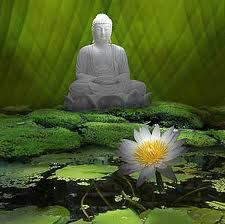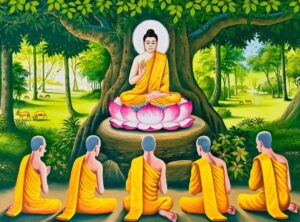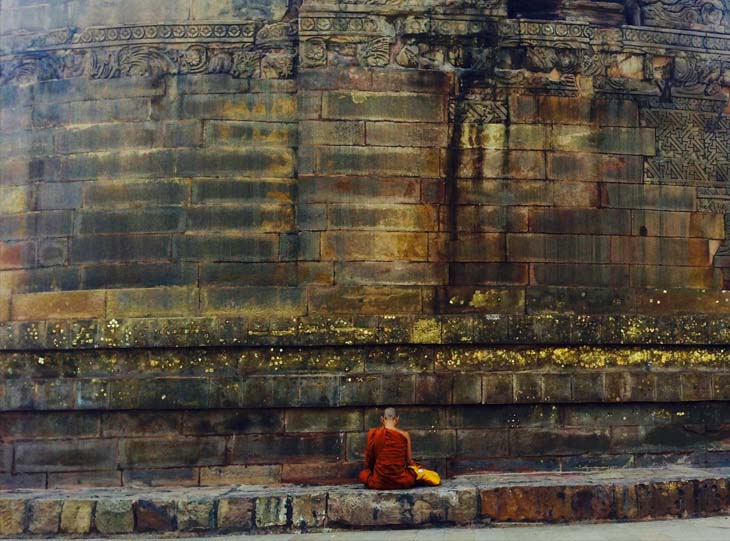Buddhist Meditation
(ĀNAPĀNA SATI, SAMATHA, VIPASSANĀ AND LOVING-KINDNESS)
 The gift of Dhamma excels all other gifts!
The gift of Dhamma excels all other gifts!
The Pāli word bhāvanā means mental culture or mental development.“ Buddhist bhāvanā….is mental culture in the full sense of the term. It aims at cleansing the mind of impurities and disturbances, such as lustful desires, hatred, ill-will, indolence, worries and restlessness, skeptical doubts, and cultivating such qualities as concentration, awareness, intelligence, will, energy, the analytical faculty, confidence, joy, tranquility, leading finally to the attainment of highest wisdom which sees the nature of things as they are, and realize the Ultimate Truth, Nibbāna. (Walpola Rāhula, What the Buddha Taught)
In Buddhism there are two kinds of meditation:
- Samatha Bhāvanā
Samatha is the development of one-pointedness of mind and concentration. Samādhi is the concentrated, peaceful, still and unshaken state of mind.
- Vipassanā bhāvanā
Vipassanā is the intuitive insight into the nature of things and leads to the realization of Nibbāna (enlightenment)
 DEVELOPMENT OF CONCENTRATION (SAMATHA)
DEVELOPMENT OF CONCENTRATION (SAMATHA)
“He may watch his inhalation and exhalation at the start. By no means should he force breath in or out. He should just be aware of his breath as it passes in and out while letting the breath go in and out automatically in its own way. He has only to be watchful, mindful and attentive to it. If he is a long-nosed person, the breath will touch the tip of his nose first, if his nose is a short one, the breath will touch his upper lip first. He should fix his mind and attention on the spot the breath first touches, the tip of the nose or the upper lip, as the case may be. To be conscious and mindful of, or attentive to, one’s breath is the preliminary step of the practice.” (Balangoda Ānanda Maitreya, Meditation on Breathing)
INSIGHT DEVELOPMENT (Vipassanā)
“Some meditators practice Vipassanā (insight development) from the beginning. They do not try to attain ecstatic trances. They start with being mindful of inhalation and exhalation. Then by counting breaths….they develop concentration and mindfulness. Next they stop counting and develop mindfulness over extension of breaths both long and short, and then contemplate over the start, middle and end of inhalation and exhalations. They examine the feelings that arise at the breath’s first touch on the tip of the nose or upper lip and see impermanence, unsatisfactoriness and egolessness of feelings. Then they examine the consciousness (mind unit) perception (sañña) and other mental factors (sankhārā) that arise together with the feeling and see that all of them are impermanent, and therefore not satisfactory, and unsubstantial (egoless)” (Balangoda Ānanda Maitreya, Meditation on Breathing)
 MEDITATION IN DAILY LIFE (BHAVANĀ)
MEDITATION IN DAILY LIFE (BHAVANĀ)
“Another very important, practical and usual form of ‘meditation’ (mental development) is to be aware and mindful of whatever you do, physically or verbally, during the daily routine of work in your life, private, public of professional. Whether you walk, stand, sit, lie down or sleep, whether you stretch or bend your limbs, whether you look around, whether you put on your clothes, whether you talk or keep silence, whether you eat or drink, even whether answer the call of nature—in these and other activities, you should be fully aware and mindful of the act you perform at the moment. That is to say, that you should live in the present moment, in the present action. That does not mean that you should not think of the past or the future at all. On the contrary, you should think of them in relation to the present moment, the present action, when and where it is relevant. (Walpola Rāhula Thera, ‘What the Buddha Taught’)
Concentration on Respiration
(Ānāpana Sati)
Ānāpana Sati is mindfulness on respiration. Ānā means inhalation and Apāna, exhalation. Concentration on the breathing process leads to one-pointedness of the mind and ultimately to Insight which enables one to attain Sainthood or Arahatship.The Buddha also practiced concentration on respiration before he attained enlightenment.
This harmless concentration may be practiced by any person irrespective of religious beliefs adopting a convenient posture keep the body erect, place the right hand over left hand, eyes may be closed or half-closed.
Easterners generally sit cross-legged with the body erect .they sit placing the right foot on the left thigh and the left foot on the right thigh. This is the full position. Sometimes they adopt the position that is by simply placing the right foot on the left thigh or the left foot on the right thigh.
When the triangular position is assumed the whole body is well-balanced.
Those who find the cross-legged posture too difficult may sit comfortably in a chair or any other support sufficiently high to rest the legs on the ground.
If it of no importance which posture one may adopt provided the position is easy and relaxed.
Head should not be drooping .neck should be straightened so that nose may be in perpendicular line with the naval.
Buddhas usually adopt the full lotus position. They sit with half closed eyes looking not more than a distance of three and half feet.
Before the practice, bad air from the lungs should be breathed out slowly thought the mouth and then the mouth should be closed.
Now inhale thought the nostrils normally, without strain, without fore. Mentally count one. Exhale and count two. Inhale and count three. Count up to ten constantly concentrating on the breathing process without thinking of anything else. While doing so one’s mind may wander. But, one need not be discouraged. Gradually one may increase the number of series—say five series of ten.
Later, one may inhale and pause for a moment, concentrating merely on inhalation without counting, exhale and pause for a moment. Thus inhale and exhale concentrating on respiration. Some prefer counting as it aids concentration while others prefer not to count what is essential is concentration and not counting which is secondary.
When one practices this concentration one feels very peaceful, light in mind and body. After practicing for a certain period a day might come when one may realize that this so-called body is supported by mere breath that body perishes when breathing ceases. One fully realizes impermanence. Where there is change there cannot be a permanent entity or an immortal soul. Insight can then be developed to attain Arahantship.
It is clear that the object of this concentration on respiration is not merely to gain one-pointedness but also to cultivate Insight to obtain deliverance from suffering.
In some discourses this simple and harmless method of respiration is described as follow:-
“Mindfully he inhales; mindfully he exhales.”
- When making a long inhalation he knows: ‘I make a long inhalation’; when making a long exhalation he knows: ‘I make a long exhalation.’
- When making a short inhalation he knows: ‘I make a short inhalation’; when making a short exhalation he knows: ‘I make a short exhalation.’
- Clearly perceiving the entire breathing process (i.e, the beginning, middle and end), ‘I will inhale’; thus he trains himself; clearly perceiving the entire breathing process. ‘I will exhale’; thus he trains himself.
- Calming the respirations, ‘I will inhale’; thus he trains himself; calming the respirations, ‘I will exhale’; thus he trains himself.
 MEDITATION ON LOVING-KINDNESS (METTĀ)
MEDITATION ON LOVING-KINDNESS (METTĀ)
Think thus——–
My mind is pure, free from all respirations; free from lust, hatred and ignorance; free from all evil thoughts.
My mind is pure and clean. Like a polished mirror is my stainless mind.
As a clean and empty vessels filled with pure water I now fill my clean heart and pure mind with peaceful and sublime thoughts of boundless loving-kindness, over-flowing compassion, sympathetic joy and perfect equanimity.
I have now washed my mind and heart of anger, ill-will, cruelty, violence, jealousy, envy, passion and aversion.
Think ten times—–
May I be well and happy!
May I be free from suffering, disease, grief, worry and anger!
May I be strong, self-confident, healthy and peaceful!
Think thus——
Now I charge every particle of my system, from head to foot, with thoughts of boundless loving-kindness and compassion. I am the embodiment of loving-kindness and compassion. My whole body is saturated with loving-kindness and compassion. I am a stronghold, a fortress of loving-kindness and compassion. I am nothing but loving-kindness and compassion. I have sublimated myself, elevated myself, ennobled myself.
Think ten times—
May I be well and happy!
May I be free from suffering, disease, grief, worry and anger!
May I be strong, self-confident, healthy and peaceful!
Think-
Mentally I create an aura of loving-kindness around me. By means of this aura, I cut off all negative thoughts, hostile vibrations. I am not affected by the evil vibrations of others. I return good for evil, loving-kindness for anger, compassion for cruelty sympathetic joy fo jealousy. I am peaceful and well-balanced in mind.
Now I am a fortress of loving-kindness, a stronghold of morality.
What I have gained I now give unto others.
Think of all your near and dear ones at home, individually or collectively, and fill them with thoughts of loving-kindness, and wish them peace and happiness, repeating; “May all beings be well and happy!” Then think of all seen and unseen beings, living near and far, men, women, animals and all living beings, in the East, West, North, South, above and below, and radiate boundless loving-kindness without any enmity or obstruction, towards all, irrespective of class, creed, colour or sex.
Think that all are your brothers and sisters, fellow-beings in the ocean of life. You identify yourself with all. You are one with all.
Repeat ten times—May all beings be well and happy….and wish them all peace and happiness.
In the course of your daily life, try to translate your thoughts into action as occasion demands.
(BUDDHISM IN A NUTSHELL. Nārada Thera)
DIVINE ABODES/SUBLIME STATES (Brahmavihāra)
BOUNDLESS STATES/ILLIMITABLES (Appamañña)
- Mettā loving-kindness (direct enemy hatred, indirect enemy affection)
- Karunā compassion (direct enemy cruelty, indirect enemy passionate grief)
- Muditā sympathetic joy (direct enemy jealousy, indirect enemy exhilaration)
- Upekkhā equanimity (direct enemy attachment and aversion, indirect enemy callousness.)
Metta bhāvanā is frequently practiced as a form of samatha meditaion.
“Mettā should be prctised first towards oneself. In doing so a person should charge his mind and body with positive thoughts of peace and happiness. He should think how he could be peaceful, happy, free from suffering, worry and anger. He then becomes the embodiment of loving-kindness. Shielded by loving kindness, he cuts off all hostile vibrations and negative thoughts. He returns good for evil, love for anger. He becomes ever tolerant and tries his best not to give occasion for anger to any. Himself beaming with happiness, he injects happiness into others not only inwardly but also outwardly by putting his mettā into practice in the course of his daily life.
When he is full of peace and is free from thoughts of hatred, it is easy for him to radiate loving kindness towards others. What he does not possess he cannot give to others. Before he tries to make others happy he should first be happy himself. He should know the ways and means to make himself happy.” (The Buddha and His Teachings—Nārada Thera)
 The Buddhist Way
The Buddhist Way
The Buddhist way to meditation is through Sila, Samādhi and Panna. That means – morality, concentration and wisdom. First, we have to develop our moral background by voluntarily observing certain moral principles and virtues. That is the foundation for a good religious way of life. If we violate the universal law of cause and effect (karma), we will have to experience the bad effects sooner or later. That is why the Buddha introduced a moral code in the form of precepts so that we can live in harmony with existing living beings and maintain a healthy, peaceful atmosphere which will promote the well being of all.
If each and every person in this world were to radiate loving-kindness, compassion and understanding towards others, there would be less fear, tension or suspicion. Everybody can live peacefully.
After that we have to concentrate more on mental development to achieve calmness and peace. That is samadhi, deep concentration. When the mind is calmed we gain panna, or realisation. Through meditation, we can gain calmness of the mind, understanding or wisdom. This is our main object. The confidence and understanding that we gain through meditation are very important as these achievements help us to avoid undue worries and frustration. We sometimes imagine that our problems are due to the influence of evil spirits, ghosts, charms or black magic or tend to suspect and blame others for these problems. We should try to understand the true nature of life. We meditate not only for our spiritual development but also to maintain our poise and equilibrium in our day-to-day life. If we can maintain patience and tolerance, we will not be easily provoked by others, for we can understand and see things in their correct perspective.
When we develop our mind to the fullest by cultivating virtues and positive qualities, maintaining our human dignity, and observing morality and discipline, we experience real freedom. This makes us appreciative of those who have achieved that end. We pay homage to them. Happy are those who have developed detachment, maintain peace and contentment in their lives.
The highest service man can perform to society is to abstain from evil. A developed and cultured mind can contribute to the wealth and happiness of mankind. Meditation is simply not a waste of time. It expands the mind of a meditator in love and wisdom, and enables him to solve many human problems and enlighten others as well.
Through meditation, we will be able to make the right decision when we are in doubt as to which way to turn. These qualities cannot be bought anywhere. No amount of money or property can buy the qualities attained through meditation. (Dr. K. Dhammananda Thera) Meditation the Only Way,
Impediments to Progress
Some people face difficulties when they attempt to meditate for the first time. They may even experience some uneasiness when they meditate on certain objects. The reason may be that they have chosen the wrong object for their meditation. The wrong object may also create some physical or mental problems, although this in itself is not dangerous.
However, meditation can be a problem to emotionally unstable people who find it difficult to maintain a proper balance in their mind. Beginners may feel frustrated because of their desire to experience good results immediately. If you understand the nature of the mind, you will realize that it is not easy to gain immediate results. We have heard of over enthusiastic young men and women literally going out of their minds because they are over ambitious, adopt the wrong attitude towards meditation and also because they are not properly guided.
Stubbornness, illusion, hallucination and delusion invariably pollute the mind. To remove such mental impurities and hindrances, one has to strive diligently and make use of one’s confidence and determination. Good results will eventually follow. One must have lots of patience in order to progress in meditation.
In Buddhism, as in other eastern cultures, patience is an important virtue. The mind must be brought under control gradually. One should not aspire for the higher states without proper and systematic training. Meditation is a gentle way of weakening the defilements which pollute the mind. If people want ‘success’ or ‘achievement’ to boast to others that they have attained this or that level of meditation, they are abusing this method of mental culture.
One must be established in morality and clearly understand that to be fruitful in the discipline of meditation, worldly achievements must not be equated with spiritual development. Ideally, it is beneficial to learn under an experienced teacher or instructor to progress along the right path. But above all, one must never be in a hurry to achieve too much too quickly.
The Power Of Meditation
- Krishnamurti, the enigmatic spiritual teacher gives an elucidative definition of meditation. He says: Meditation is not an escape from the world; it is not an isolating self-enclosing activity, but rather the comprehension of the world and its ways. The world has little to offer apart from food, clothes and shelter, and pleasure with its great sorrows. What is important in meditation is the quality of the mind and the heart. It is not what you achieve, or what you say you attain, but rather the quality of a mind that is innocent and vulnerable. Through negation there is the positive state.
Merely to gather, or to live in, experience, denies the purity of meditation. Meditation is not a means to an end. It is both the means and the end. The mind can never be made innocent through experience. It is the negation of experience that brings about that positive state of innocence which cannot be cultivated by thought. Thought is never innocent; meditation is the ending of thought, not by the meditator, for the meditator is the meditation. If there is no meditation, then you are like a blind man in a world of great beauty, light and colour. Meditation is very useful in helping a person to live peacefully despite various disturbances that are so prevalent in this modern world. Not everyone can retire to a forest or to live in ivory towers ‘far from the madding crowd.’
Through the practice of meditation we can confront and face the pressures of modern living. Meditation practiced conscientiously will help a person to face, understand and overcome every problem pertaining to life. For meditation to proceed and progress, the mind must be completely neutralized from desire and aversion. Of course, at the beginning, one will find this extremely difficult. We cannot control the mind in a single attempt, especially by force, but should apply right effort through practice and understanding.”
Each morning, the light of the Sun dispels the darkness of the night. It makes no difference which part of the world is shining upon, or in which season or year. Similarly, the light of Vipassana dispels the darkness of ignorance and of misery regardless of the time or place. Thus is no wonder the light of Vipassana—the light of wisdom—-has proven itself of such relevance to the modern world.
S.N. Goenka
May all beings be happy, healthy and well !!!

